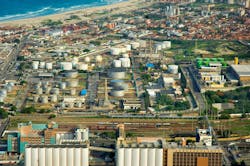Petrobras advances carbon-neutral plan for LUBNOR refinery
Petróleo Brasileiro SA (Petrobras) is progressing with decarbonization plans as part of the carbon-neutral master plan (CNMP) for the operator’s 10,000-b/d Lubrificantes e Derivados de Petróleo do Nordeste (LUBNOR) refinery in Fortaleza, Ceará, Brazil.
Subsidized with resources from the Carbon Neutral Program—the company’s energy transition initiative—Petrobras is undertaking studies for proposed investments aimed at decarbonizing operations at LUBNOR, the operator confirmed in mid-April.
First announced in early April at an on-site event at the refinery, Petrobras said the LUBNOR studies will evaluate a mix of projects designed to accelerate identification and development of the best solutions for completely eliminating carbon dioxide (CO2) emissions from the manufacturing site.
One such project under evaluation for LUBNOR involves replacing natural gas the refinery currently for energy generation with biomethane, a fuel that will also potentially be used to produce hydrogen.
Petrobras estimated LUBNOR’s use of biomethane should reduce the refinery’s direct CO2 emissions—which presently average about 60,000 tonnes/year (tpy)—by 100%.
Additional carbon-reduction measures at LUBNOR include plans for the refinery to begin producing biobunker—a marine fuel with renewable content. While Petrobras carried out tests in 2023 for bunker containing 10-24% of biodiesel—composed of vegetable oil, or fatty acid methyl ester (FAME)— new testing was under way as of early 2024 for bunker containing 24% FAME (tallow), the operator said in a late-January 2024 presentation to investors.
Alongside biobunker, Petrobras said it also is planning for LUBNOR to produce asphalt CAP Pro, which—in addition to its lower environmental impact—creates the possibility of recycling aged asphalts and reducing energy consumption during application.
Other new products Petrobras is considering for LUBNOR that would create a more sustainable portfolio for the refinery, as well as boost renewable content of the site’s total production to about 10%, include:
- Naphthenic lubricants produced with low-carbon hydrogen,
- Aviation kerosine with renewable or low-carbon content.
- Low-sulfur S-10 diesel (10 ppm sulfur) type S-10 RX, which would be composed of renewable content.
In addition to expanded production of low-carbon products, Petrobras intends for LUBNOR to use renewable electricity to power the site’s processes, which should neutralize indirect-CO2 emissions from the site by 100%, according to the operator.
The LUBNOR decarbonization plan comes as part of Petrobras’ broader CNMP plans for its processing sites under the company’s 2024-28+ strategic plan to ensure carbon-neutral operations of its businesses by 2050 (OGJ Online, Jan. 18, 2024).
The renewed investments in LUBNOR follows Petrobras’ late-2023 cancellation of its contract to sell the refinery and related logistics assets to Grepar Participações Ltda. (OGJ Online, Nov. 27, 2023).
About the Author
Robert Brelsford
Downstream Editor
Robert Brelsford joined Oil & Gas Journal in October 2013 as downstream technology editor after 8 years as a crude oil price and news reporter on spot crude transactions at the US Gulf Coast, West Coast, Canadian, and Latin American markets. He holds a BA (2000) in English from Rice University and an MS (2003) in education and social policy from Northwestern University.

